September 1st, 2010 by Marloes de Valk
Today we worked on the map and quests situated at the beginning of the game. To prevent spoilers the words are blurred. We continued working with post-its, they are extremely handy during a brainstorm in which everything changes every 2 minutes. The whole map is color coded, blue for locations, green for situation, yellow for actions and pink for inventory (items, coins, etc.). The arrows and dotted lines are mostly there to confuse cause we kept moving notes around.
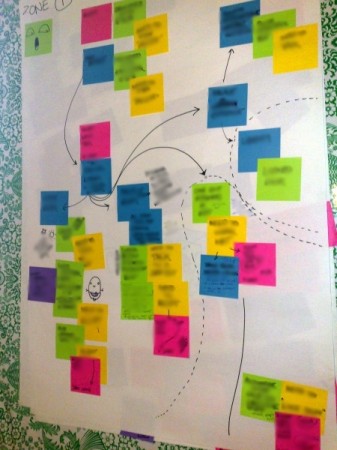
At 16.00 we presented Naked on Pluto to the crew of NIMk and we were very happy Angela Plohman from BALTAN Laboratories came to join us (we’ll be at BALTAN in October for the next sprint). We discussed the project in its current state, and talked about the steps in development we’ve taken so far, the biggest problems we’ve encountered and the next steps. Explaining these things at this stage of the project was quite a test for us. We’ve been submerged in the game’s logic for 3 days now, and we’re starting to loose our sense of reality ever so slightly…
Tags: game mechanics, map post-it brainstorm sprint quest, vertical slice
Posted in script writing | 1 Comment »
August 31st, 2010 by Dave Griffiths
Today was all about taking the themes from yesterday and making them into concrete game mechanics we can use. We started by mapping out possible constraints imposed by multiplayer activities. We want a large amount of what you do on pluto to be coordinated with other players – and this impacts on the logic of the game world. For instance, doors can be locked – sometimes in a room full of people we only want players who are carrying a key to be able to get through the door, at other times a single player might be able to unlock a door for everyone (perhaps for a limited time).
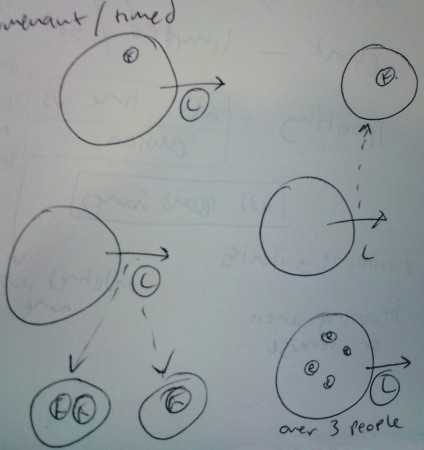
A locking conundrum.
This sort of play requires a way for players to coordinate with each other, for example using a realtime chat system. A minor crisis involving the details of how to handle this feature was narrowly averted and we escaped to the shores of Ljsselmeer to begin considering the vertical slice, the moustache as core game feature, community service and mandatory fanny packs.
Tags: nimk sprint
Posted in script writing, technical | No Comments »
August 30th, 2010 by Marloes de Valk
Today was the first Naked on Pluto sprint day at the Netherlands Media Art Institute. We focussed on script writing and created this little masterpiece:
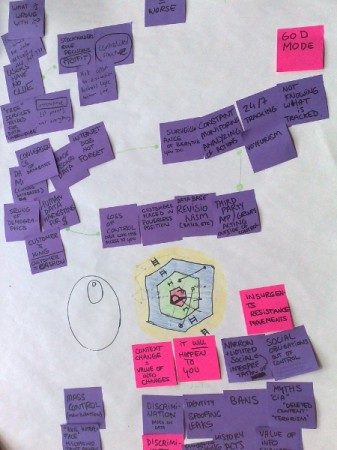
It’s an inventory of all our reasons for wanting to make this game and an attempt of integrating them into the game design in a meaningful way. We made lots of progress on the world and non-player character design. Tomorrow we continue with the design of a vertical slice and we’ll break our heads over some scalability problems.
Tags: character design, nimk, sprint, writing
Posted in script writing | 1 Comment »
August 26th, 2010 by Marloes de Valk
Today I have been working on Elastic Versailles Love-bot revision 1, a very buggy red velvet chatterbot that tries to make visitors feel loved, attractive and confident. Love-bots are part of Elastic Versailles’ intricate ways of entertaining visitors and putting them into the right mindset to freely share personal information with its agents, soak up mountains of advertisements and spend coins like there’s no tomorrow. The Eliza-effect is not quite there yet…
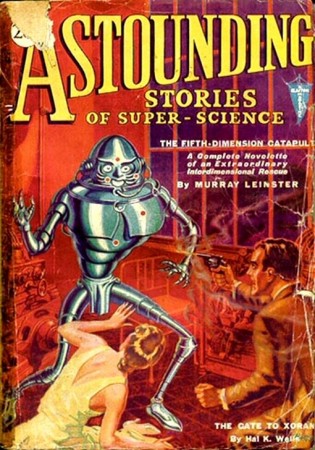
Love-bot: Talk to me honey Read more »
Tags: AI, bot, Eliza-effect, robot
Posted in script writing | No Comments »
August 20th, 2010 by Marloes de Valk
Just finished reading Issue 19 of Open, ‘Beyond Privacy, new perspectives on the public and private domains‘. The angle is to stop crying over spilt milk, “taking the present situation of ‘post-privacy’ for what it is and trying to gain insight into what is on the horizon in terms of new subjectivities and power constructions”. I particularly enjoyed the articles by Daniel Solove and Felix Stalder, both redefining privacy (not a fan of Stalder’s 2.0 addition, but the article is a good read) while refraining from putting all responsibility on the user/consumer/citizen, and investigating strategies for law and state to better protect the right of individuals to privacy.
In “Autonomy and Control in the Era of Post-privacy”, Felix Stalder argues for Privacy 2.0: new strategies for connective opacity that should make clear what people outside a network can see of what goes on inside, and what providers of those infrastructures can see of the inside as well, and all of that using mandatory transparency of the protocols they use to provide their services, so that discrimination can be contested. Read more »
Tags: article, data mining, law, privacy
Posted in contextual | No Comments »
August 14th, 2010 by aymeric
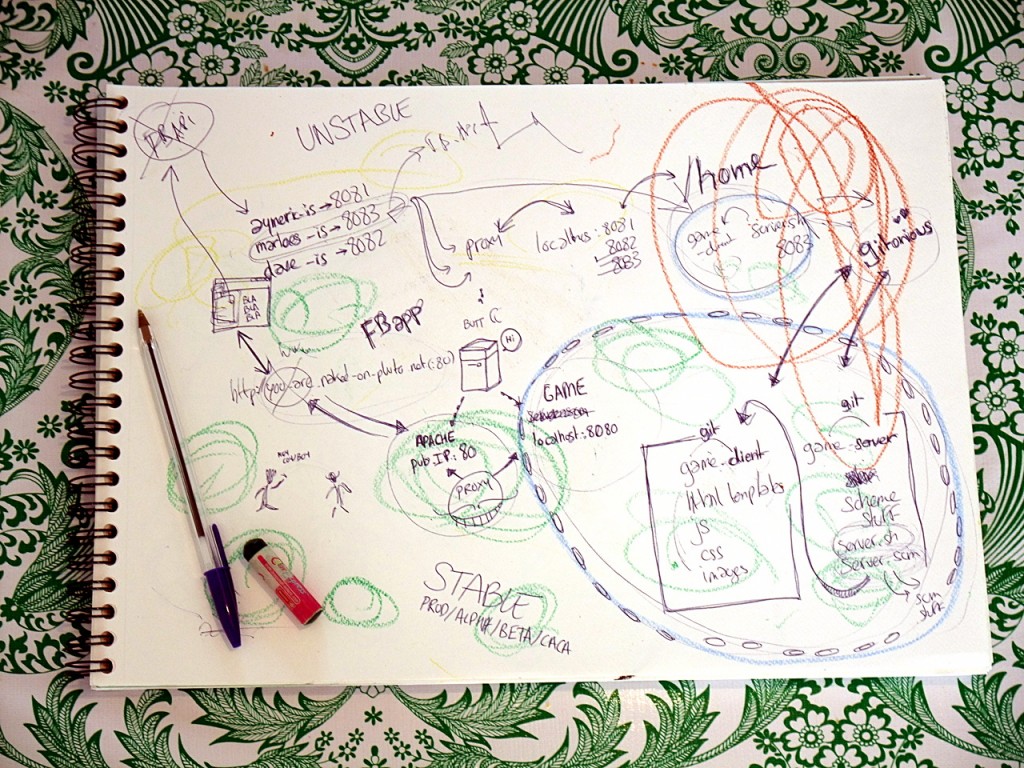
Developing some piece of software on your own is usually simple in terms of infrastructure as you can do pretty much everything you want, including using all kind of tools and workflows that nobody else would need to understand or appreciate. This is of course another story when several people are involved, and usually working at the same time on the same project. Then you need a Master Plan (as illustrated)! Read more »
Tags: apache, API, collaboration, git, infrastructure, proxy, same origin policy, scheme, server
Posted in technical | No Comments »
July 19th, 2010 by Marloes de Valk
Online games are getting more and more popular and game mechanics are being applied everywhere in an attempt to trigger the same eager enthusiasm to participate in something, as gamers experience during gameplay. I’ve recently seen 2 talks that explore this phenomenon: Jesse Schell’s talk at DICE 2010, and Jane McGonigal’s talk at TED. Both talks touch upon the same topic, the power of games to change our (real world) behaviour, but take an opposite approach, here’s a short analysis:
Schell talks about the future of game design as it invades the real world. He analyses the immense success of Facebook games such as Farmville and Mafia wars. What do they have in common? Read more »
Tags: crowd sourcing, game mechanics
Posted in contextual | No Comments »
July 5th, 2010 by Dave Griffiths
Our design for for Naked on Pluto isn’t (all that) public yet as it’s very much in the sensitive hand wavy might all change our minds stage, but it will be sooner or later. In the meantime, here are two of the games design practises we are trying out.
User centred design
This one I was taught at a design workshop by Ylva Fernaeus, Sara Ljungblad and Mattias Jacobsson from SICS, but I recognise it from elsewhere, and it was good to have it explained in full.
One part of ‘UCD’ (as I’m sure it’s abbreviated to to confuse the initiates) is called user stories. You make up a fictitious person who might play your game, and describe who they are, why they are playing and what their motivations are etc – you can get quite carried away with this, and within sensible margins, it seems to help.
Then you describe the experience of the game from their point of view. This means you can leave out all the details and focus on what you want them to feel – from the inside. Read more »
Tags: games design practices, malleability, user centred design, vertical slice
Posted in script writing | No Comments »
June 27th, 2010 by Dave Griffiths
I have been recently trying to understand how multiplayer online worlds work, from the basic technical matters, to higher level game mechanics. This is a new area for me, and seems a bit of a black art so I thought I’d write some of the things I’ve discovered here for others following a similar path, or more likely, so people can tell me where I’m heading in the wrong direction.
I had to start with the complete and utter basics (as a recovering computer graphics guy) and to start with these games are split between a client and a server. The clients I’m interested in run in players browsers, and the server needs to be on a machine which is running all the time to provide the persistent world, and record the changes people make.
In terms of languages, when considering the client you are quite restricted as to what you can use. Every browser has a Javascript interpreter, and most people have flash – sidestepping the hot potato I’ve already written a bit about. Luckily for flash there is also haxe. Read more »
Tags: ajax, flash, haxe, javascript, jquery, json, racket, same origin policy, scheme, security, xss
Posted in technical | No Comments »
June 26th, 2010 by aymeric
Here is a post from a chapter that I wrote for the Walled Garden publication released in 2009 by Virtueel Platform as a follow up of the 2008 Walled Garden conference in Amsterdam. The book was edited by Annet Dekker en Annette Wolfsberger. Reading my paper again today, I did not change my mind on the issues of “information exhibitionism” and “privacy as currency for gratis services”, but I would certainly mention the recent discussions that are happening in the GNU Social list, as well as several other efforts to develop social software as a distributed infrastructure.
Introduction
Used and abused by many, the notion of “2.0, 3.0, x.0” is mostly jargon that inherited its vagueness from a desire to inflate technological value and its cultural impact. This is nothing but a commercial attempt to resuscitate the dotcom era by promising a future of connected services and communication. Unfortunately there is nothing new in terms of network infrastructure nor in terms of how people have used the Internet to date. At most, another layer of abstraction has been built on pre-existing technology, and some interoperability has been added in terms of data exchange. It doesn’t matter though, if all this vapour ends up either up in the clouds, or stuck in condensation on some forgotten server. All of us are experiencing how the use of the Internet and the growing dependence on computation has a serious impact on our everyday lives. There is no need to pretend this is a side effect of new web application trends and their social impact. On the contrary, the transition phase we are experiencing now is rather simple to understand: humanity has started its slow shift from total offline activity to complete online and digitally assisted life. Read more »
Tags: API, black box, cloud computing, cloud storage, communication, data, data centers, distributed, floss, free software, Internet, marketing, open source, privacy, social networks, virtueel platform, walled garden, web 2.0
Posted in contextual | No Comments »




